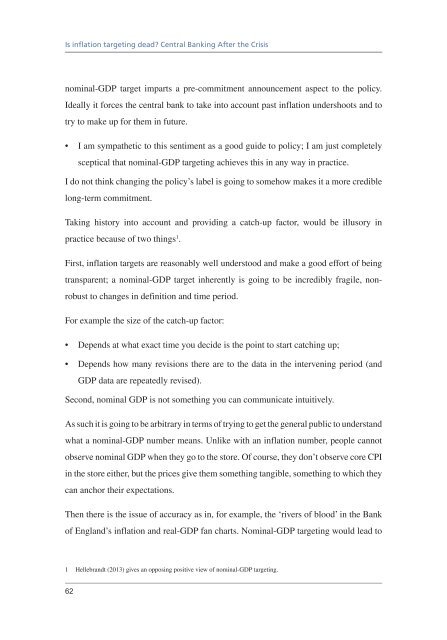Is inflation targeting dead? Central Banking After the Crisis - Vox
Is inflation targeting dead? Central Banking After the Crisis - Vox
Is inflation targeting dead? Central Banking After the Crisis - Vox
You also want an ePaper? Increase the reach of your titles
YUMPU automatically turns print PDFs into web optimized ePapers that Google loves.
<strong>Is</strong> <strong>inflation</strong> <strong>targeting</strong> <strong>dead</strong>? <strong>Central</strong> <strong>Banking</strong> <strong>After</strong> <strong>the</strong> <strong>Crisis</strong>nominal-GDP target imparts a pre-commitment announcement aspect to <strong>the</strong> policy.Ideally it forces <strong>the</strong> central bank to take into account past <strong>inflation</strong> undershoots and totry to make up for <strong>the</strong>m in future.• I am sympa<strong>the</strong>tic to this sentiment as a good guide to policy; I am just completelysceptical that nominal-GDP <strong>targeting</strong> achieves this in any way in practice.I do not think changing <strong>the</strong> policy’s label is going to somehow makes it a more crediblelong-term commitment.Taking history into account and providing a catch-up factor, would be illusory inpractice because of two things 1 .First, <strong>inflation</strong> targets are reasonably well understood and make a good effort of beingtransparent; a nominal-GDP target inherently is going to be incredibly fragile, nonrobustto changes in definition and time period.For example <strong>the</strong> size of <strong>the</strong> catch-up factor:• Depends at what exact time you decide is <strong>the</strong> point to start catching up;• Depends how many revisions <strong>the</strong>re are to <strong>the</strong> data in <strong>the</strong> intervening period (andGDP data are repeatedly revised).Second, nominal GDP is not something you can communicate intuitively.As such it is going to be arbitrary in terms of trying to get <strong>the</strong> general public to understandwhat a nominal-GDP number means. Unlike with an <strong>inflation</strong> number, people cannotobserve nominal GDP when <strong>the</strong>y go to <strong>the</strong> store. Of course, <strong>the</strong>y don’t observe core CPIin <strong>the</strong> store ei<strong>the</strong>r, but <strong>the</strong> prices give <strong>the</strong>m something tangible, something to which <strong>the</strong>ycan anchor <strong>the</strong>ir expectations.Then <strong>the</strong>re is <strong>the</strong> issue of accuracy as in, for example, <strong>the</strong> ‘rivers of blood’ in <strong>the</strong> Bankof England’s <strong>inflation</strong> and real-GDP fan charts. Nominal-GDP <strong>targeting</strong> would lead to1 Hellebrandt (2013) gives an opposing positive view of nominal-GDP <strong>targeting</strong>.62














